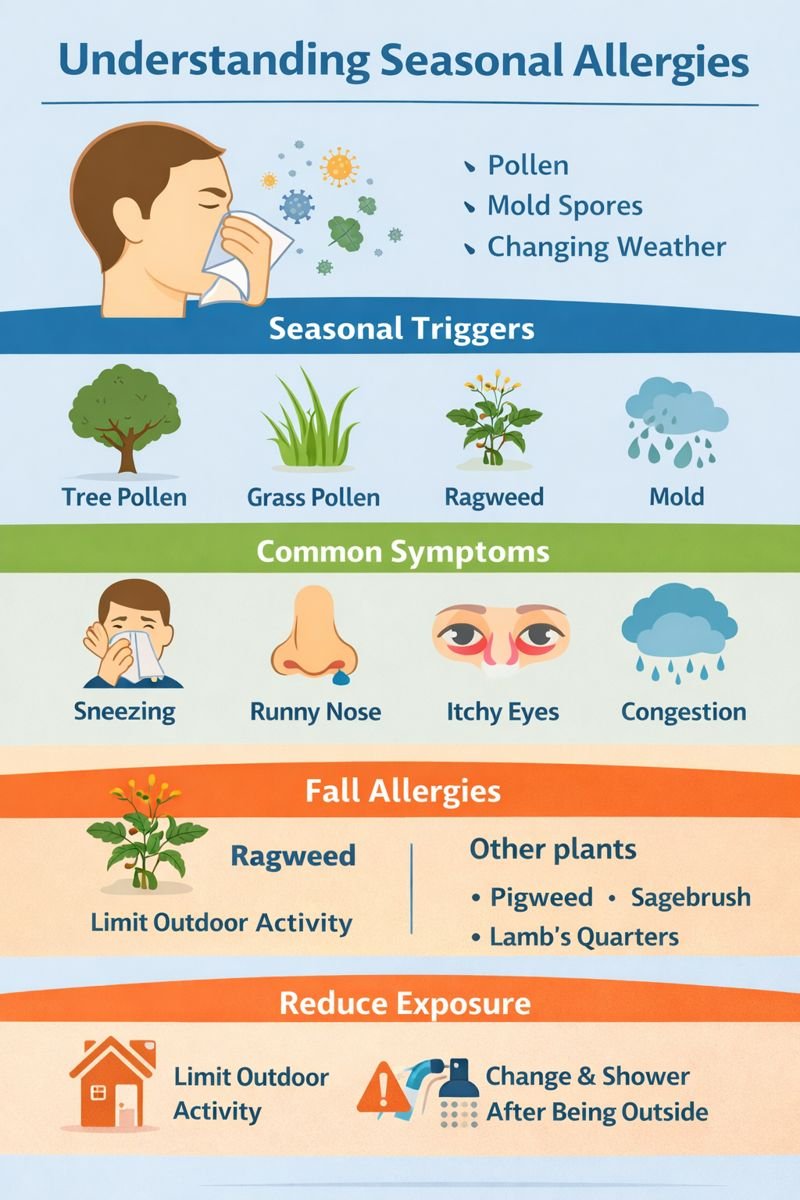Seasonal Allergies: Triggers, Symptoms, and First Aid Awareness in Canada
Seasonal allergies—sometimes called hay fever—occur when the immune system reacts to airborne substances such as pollen or mold spores during certain times of the year. These reactions can cause sneezing, congestion, itchy eyes, and a runny nose, often returning annually in predictable seasons.
In Canada, seasonal allergies are common from early spring through fall due to changing weather patterns, plant pollination cycles, and humidity levels.
First Aid & Workplace Relevance (Canada)
Seasonal allergies frequently affect employees in offices, warehouses, construction sites, landscaping, schools, and outdoor workplaces. Symptoms such as congestion, fatigue, and watery eyes can interfere with focus, comfort, and productivity, even though allergies are not contagious or usually dangerous.
First aid awareness in Canadian workplaces helps supervisors and workers recognize allergy symptoms early, distinguish them from colds or infections, and support practical steps that reduce exposure during high-allergen periods.
Scenario: Allergy Awareness at Work
During a warm spring week, a facilities employee began experiencing sneezing, itchy eyes, and nasal congestion each morning after outdoor tasks. A coworker trained in first aid recognized the pattern as seasonal allergy symptoms rather than illness. The employee adjusted outdoor work timing where possible and took steps to reduce allergen exposure, helping them remain comfortable and productive throughout the season.
Common Symptoms of Seasonal Allergies

-
Sneezing
-
Runny or stuffy nose
-
Itchy nose, throat, or eyes
-
Watery or red eyes
-
Cough related to postnasal drip
-
Fatigue or reduced concentration
Symptoms often occur during specific months each year and may improve when exposure to triggers is reduced.
What Causes Seasonal Allergies?
Seasonal allergies are triggered by airborne allergens released during plant growth cycles and environmental conditions. Common causes include:
-
Tree pollen, often appearing in late winter and spring
-
Grass pollen, common from late spring into summer
-
Ragweed pollen, a major trigger from late summer into fall
-
Mold spores, which thrive in damp, warm, or humid conditions
Weather patterns influence allergen levels. Warm days, cool nights, low wind, and high humidity can all affect how pollen and mold spread through the air.
Fall Allergy Triggers
Fall allergies are especially common in Canada due to ragweed, a plant that grows widely and releases pollen from approximately August through November.
Other fall allergy triggers may include:
-
Pigweed
-
Burning bush
-
Cocklebur
-
Sagebrush
-
Lamb’s quarters
These plants can affect both urban and rural environments.
Seasonal Allergy Awareness and General Management
From a first aid education perspective, managing seasonal allergies focuses on awareness, exposure reduction, and symptom monitoring rather than treatment decisions. Key concepts include:
-
Understanding personal allergy triggers
-
Recognizing that symptoms may recur annually
-
Being aware that weather and climate influence symptom severity
-
Knowing that allergy symptoms can overlap with colds but follow seasonal patterns
Medical professionals may recommend various management approaches depending on individual needs, but first aid training emphasizes observation and supportive awareness only.
Prevention and Workplace Considerations
General prevention strategies that support comfort during allergy season include:
-
Monitoring pollen and mold levels during peak seasons
-
Limiting outdoor exposure during times when pollen counts are highest
-
Keeping doors and windows closed in vehicles and indoor spaces when possible
-
Changing clothes and washing after outdoor work or activities
-
Maintaining clean indoor ventilation systems
These measures help reduce allergen exposure in both workplace and home environments.
Frequently Asked Questions
Are seasonal allergies the same as a cold?
Seasonal allergies are caused by immune reactions to allergens, while colds are caused by viruses. Allergies often follow a predictable seasonal pattern and are not contagious.
Can allergy symptoms last for months?
Yes. Some people experience symptoms throughout multiple seasons, especially if exposed to different allergens at different times of the year.
Why are symptoms worse in the morning?
Pollen levels often peak in the early morning, which can increase symptoms after waking or commuting.
Do weather conditions affect allergy severity?
Yes. Warm, windy days can spread pollen, while humidity and rain can increase mold growth, affecting symptom intensity.
Can seasonal allergies affect job performance?
Ongoing symptoms such as congestion, headaches, and fatigue may reduce comfort and concentration, particularly in physically demanding or outdoor roles.
Educational Note
This article is intended for general public education and first aid awareness. It does not provide medical diagnosis or treatment advice. First aid training focuses on recognizing symptoms, reducing exposure, and knowing when further assessment may be helpful.
